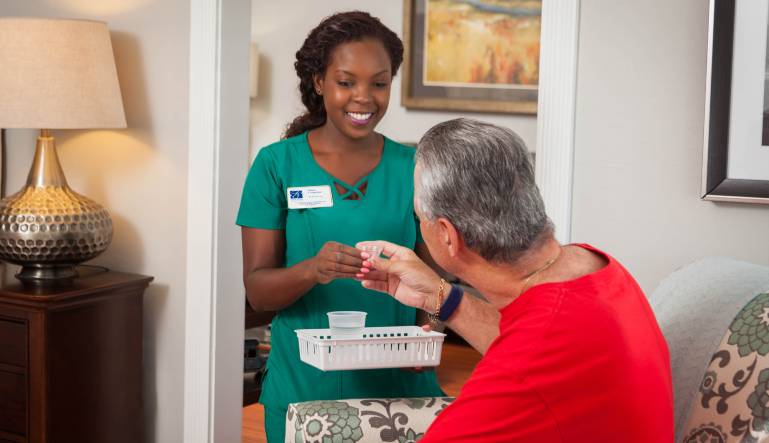
If an elderly person is having difficulty with activities of daily living (ADLs), personal care can be beneficial. ADLs are tasks that you do every day, like dressing, grooming or eating. Although some tasks might be more difficult for seniors than others, all of them should be completed with dignity.
The need for personal care will depend on a variety of factors. It will depend on the senior's ability to function independently, their health and other factors.
It is also important for elderly people to be aware of their emotional state. An elderly person may have difficulty completing these tasks if they are suffering from emotional problems. However, a positive attitude can help them perform these tasks safely and effectively.

Another problem with this task is that it can be difficult for elderly people to remember specific details such as their name, the date or names of their children and grandchildren. If these things are forgotten, it can be a very embarrassing situation. It is best to hire a professional who can track all details so you don't get embarrassment.
Some seniors may notice changes in their vision and memory, along with the cognitive, emotional and physical effects of aging. It can impact their ability to move around the home. You might also forget to take your medication. These are just a few of the reasons that an elderly person might need assistance with ADLs.
A professional can provide personal care that is tailored to the specific needs of seniors. Some of these services include incontinence care, companionship, and homemaking.
The senior's preference for care is an important consideration when providing personal assistance. While some seniors might prefer more direct care, others may prefer more structured, personal care. You can improve the chance of success if you offer an option that is compatible with the person's preferences.

Another important factor to consider when considering providing personal care to an elderly adult is the cost. Although personal care services are not cheap, they can be more affordable than moving into a nursing facility.
Whether you're looking to hire someone to help with elderly care or you'd like to take over the primary caregiver role, it is important to make sure your loved one is safe at home. There are many options for care, so make sure to assess your loved one's medical and emotional needs as well as the space available in your home.
A trained care provider can help your loved one feel more relaxed by helping them perform tasks that are difficult. Many families decide to hire a professional caregiver for their home.
FAQ
What is the best way to learn about health insurance?
If you have health insurance, you should keep track of your policy documents. Make sure that you understand the plan and ask questions when you have doubts. If you don't understand something, ask your provider or call customer service.
When you use your insurance, remember to use the deductible on your plan. Your deductible determines how much you have to pay before insurance will cover the rest.
What role can I play in public healthcare?
You can help protect your own health and the health of others by taking part in prevention efforts. By reporting illness and injury to health professionals, you can improve public health.
What are the different health care services?
The most important thing for patients to know is that they have access to quality healthcare at any time. We are here to help, no matter if you need an emergency appointment or a routine visit.
We offer many different types of appointments, including walk-in clinics, same-day surgery, emergency department visits, and outpatient procedures. If you live far away from our clinic, we can also provide home health care visits. We will ensure that you get prompt treatment at the nearest hospital if you aren't comfortable visiting our clinic.
Our team includes pharmacists, dentists and other professionals committed to excellent patient service. We strive to make every visit as simple and painless for our patients.
What is the difference between health policy and public health?
Both terms refer to decisions made by policymakers and legislators to affect the delivery of health services. A decision to build or renovate a hospital could be taken locally, regionally, and nationally. Similarly, the decision about whether to require employers to offer health insurance may be made by local, regional or national officials.
How can our health system be improved?
We can improve our health care system by ensuring that everyone receives high-quality care, regardless of where they live or what insurance they have.
We should ensure that all children receive necessary vaccinations, so they don't develop preventable diseases like measles, mumps, and rubella (MMR).
We must continue our efforts to lower the cost and make sure it remains available for everyone.
What should I know concerning vaccines
Vaccines can be very effective and safe ways to stay healthy. Vaccines provide immunity against certain diseases. Vaccinations can be given at specific times throughout your childhood, adolescence, or adulthood. Your doctor will help you decide when is the best time to get vaccines.
What are the various health care services available?
Patients must know that they can obtain quality healthcare at any hour. Whether you need an urgent appointment or a routine check-up, we're here to help.
There are many options for appointments. These include walk-ins, same-day procedures, emergency department visits and outpatient procedures. If you live far away from our clinic, we can also provide home health care visits. And if you don't feel comfortable coming into our office, we'll ensure you receive prompt treatment at your local hospital.
Our team includes nurses and pharmacists as well dentists. We want to make your visit as comfortable and painless possible.
Statistics
- Consuming over 10 percent of [3] (en.wikipedia.org)
- Healthcare Occupations PRINTER-FRIENDLY Employment in healthcare occupations is projected to grow 16 percent from 2020 to 2030, much faster than the average for all occupations, adding about 2.6 million new jobs. (bls.gov)
- For instance, Chinese hospital charges tend toward 50% for drugs, another major percentage for equipment, and a small percentage for healthcare professional fees. (en.wikipedia.org)
- The healthcare sector is one of the largest and most complex in the U.S. economy, accounting for 18% of gross domestic product (GDP) in 2020.1 (investopedia.com)
- The health share of the Gross domestic product (GDP) is expected to continue its upward trend, reaching 19.9 percent of GDP by 2025. (en.wikipedia.org)
External Links
How To
What is the Healthcare Industry Value Chain
The entire healthcare industry value-chain includes all activities related to providing healthcare services to patients. This includes all the business processes that occur within hospitals and clinics as well as the supply chains that link them to other providers, such as doctors, nurses, pharmacists or insurance companies. This results in a continuum that starts with diagnosis and ends with discharge.
The four key components of the value chain are:
-
Business Processes - These consist of the tasks performed by individuals throughout the entire process of delivering health care. For example, a physician might perform an examination, prescribe medication, and then send a prescription to a pharmacy for dispensing. Each step of the process must be completed accurately and efficiently.
-
Supply Chains are all the organizations responsible for making sure the right supplies reach their intended recipients at the right time. A hospital might have several suppliers. These could include lab testing facilities, imaging centres, pharmacies, or even janitorial personnel.
-
Networked Organizations: To coordinate these entities, it is necessary to have some means of communication between them. Hospitals have many departments. Each has its own number of phones and offices. Each department will have its own central point, where employees can get updates and ensure everyone is informed.
-
Information Technology Systems - IT plays a critical role in business process efficiency. Without IT, things could quickly go sour. IT also allows you to integrate new technologies in the system. Doctors can connect to a secure network connection in order to integrate electronic medical records into their workflow.